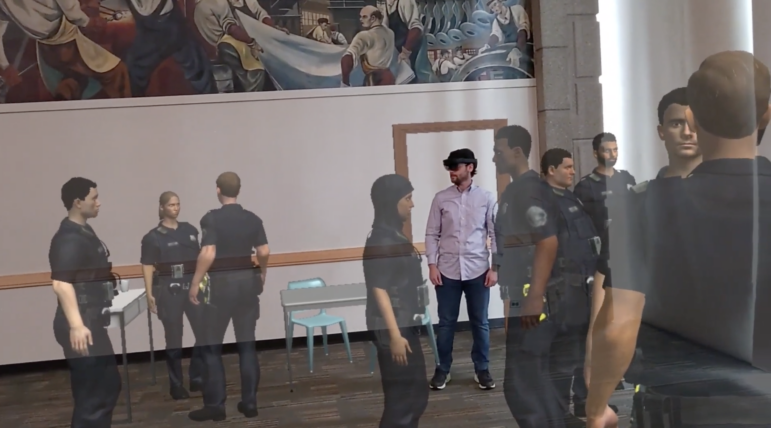
Arash Javanbakht
The ExpandXR exposure therapy programBy ANISH TOPIWALA
Capital News Service
LANSING – A young officer arrived at the scene of a crash that killed a family of four: mother, father, a 3-year-old and an infant.
At the time, the tragedy bothered Matt Saxton, who responded to the scene and is now executive director of the Michigan Sheriff’s’ Association.
But it was only two years later ,when he held his first-born son, that memories of the fatal crash caused him to cry.
“I can still see that family from 30 years ago,” he said.
At the time, resources to properly deal with such situations were not available to help law enforcement officers like Saxton, who was then a deputy sheriff in Calhoun County.
Saxton recalls that he just “finished that call and went to my next radio call.”
Today, many sheriffs’ offices have mental health resources like peer support programs to help their personnel after such events, Saxton said.
One is the Critical Incident Stress Management (CISM) system, which helps first responders cope with traumatic situations.
“If we had a critical incident, we would activate our CISM team and allow those that were directly involved with the incident to sit down and debrief those incidents freely,” Saxton said.
“Prior to providing employee assistance programs or CISM teams and our peer support teams, first responders generally didn’t talk about those issues and kept compartmentalizing them year over year – and those things begin to add up,” Saxton said.
James Tignanelli, the president of the Police Officers Association of Michigan, said stress also can result from lengthy work hours.
“There’s a lot of overtime being demanded of people,” Tignanelli said. “It’s not uncommon for them to work 16 or 18 hours in a day. Those things will tend to make the job more difficult and, I think, it creates family problems.”
The association is a union representing law enforcement officers.
It works with Frontline Strong Together, which is based at Wayne State University and covers all 83 counties in the state.
The program was funded through a state grant to provide mental health and wellness services to first responders.
It offers a 24/7 crisis and resource phone line that provides support for police officers, firefighters, emergency medical services, corrections officers and 911 dispatchers, said Manisha Leary, the program project manager at Wayne State.
In the two years since its creation, the call center has taken more than 990 calls from first responders across the state, she said.
Leary said the program has interacted with thousands of first responders, not only across the state but the country as well.
“Then when it comes to treatment, we have trained culturally competent clinicians that are able to see first responders,” Leary said.
The clinicians have experience working with first responders and specialize in areas like post-traumatic stress disorder and trauma, she said.
A new technique that Frontline Strong Together recently developed uses augmented reality technology for exposure therapy, which allows for a variety of scenarios to be used in counseling sessions that can all take place in an office.
The director of treatment and trauma services at Frontline Strong Together, Arash Javanbahkt, developed the program software called ExpandXR that runs on a virtual reality headset.
“We have created scenarios of interaction and exposure to public, safe environments you’re avoiding because of trauma,” said Javanbahkt, a psychiatrist.
Some environments the program may use for exposure therapy are a police or fire station, grocery store and rooms that may contain large numbers of people.
“We have been using this for treating these first responders, and this really triggers all the negative emotions,” he said.
“There was an officer doing grocery shopping online because of her trauma, terrified of the perpetrator,” he said. “But after several sessions, she went to her graduation ceremony, she got promoted and she went back to work.”
Leary said the Frontline Strong Together team has discussed reducing the stigma about mental illness with first responders.
“We’re losing a lot of our first responders because of not recognizing the fact that mental health and mental wellness is a thing,” she said.
Leary said there is a perception among law enforcement personnel that any sign of weakness can lead to losing their jobs or not feeling well enough equipped to work.
Such concerns can bleed into their home life, she said.
“They may not be going home and talking to their spouses or their children about what’s going on,” she said.
“There’s a lot of stress that happens from being on the job. Sometimes it’s critical incidents, but mostly it’s the accumulative years, they’ve been on the job,” Leary said.
Saxton emphasized the accumulated stress from the job.
“Men and women in law enforcement see, hear, taste, smell things on a daily basis or shift basis that the normal citizen never has to deal with,” he said.

Michigan Sheriffs’ Association
Matt Sexton is the executive director of the Michigan Sheriffs’ Association.
Credit: Police Officers Association of Michigan
Jim Tignanelli is the president of the Police Officers Association of Michigan.